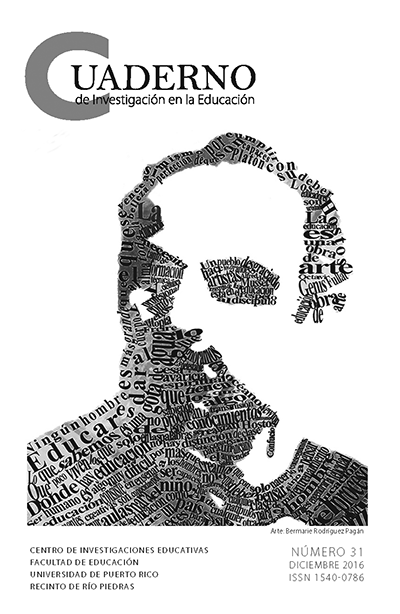Abstract
Educational systems cannot be abstracted from the use of technology; on the contrary: they should assume the duty of guidance on its uses. It is for this reason that it is necessary that educators understand the risks underlying the new computer networks and seek instruction on the available measures to prevent the violation of the rights of the child‘s personality. This research inquires about the laws that safeguard the right to honor, privacy and the right to one‘s own image of children within the transboundary exchange of information, and will consider what should be the role of the educator regarding the use of computer technology as a teaching resource in the school environment.
How to cite:
Gutarra-Cordero, A. (2016). Los riesgos de la red informática y las responsabilidades de los educadores. Cuaderno de Investigación en la Educación, 31, 56-73. Retrieved from https://revistas.upr.edu/index.php/educacion/article/view/13102
References
Azurmendi, A. (1998). El derecho a la propia imagen: Su identidad y aproximación al derecho a la información. México: Universidad Iberoamericana.
Bercovitz, R. (1976). Derecho de la persona. Madrid, España: Montecorvo.
Díez-Picazo, L. & Gullón, A. (1994). Sistema de Derecho Civil. Madrid, España: Tecnos.
Prensky, M. (2001). Digital natives, digital immigrants. Maryland, E.E.U.U.: MCB University Press.
Santos Briz, J. (1976). Derecho de daños. Madrid, España: Editorial Revista de Derecho Privado.
Vázquez Bote, E. (1972). Derecho civil de Puerto Rico. San Juan, Puerto Rico: Ediciones Generales, S.A.
Leyes consultadas
Art. 1802, Obligación cuando se causa daño por culpa o negligencia (31 L.P.R.A. § 5141 [1956]).
Children‘s Online Privacy Protection Act, 15 U.S.C. § 6501(2)(A)(ii), (1998).
Código Civil de Puerto Rico, 31 L.P.R.A. § 5141 (1930).
Electronic Communications Privacy Act (ECPA), 18 U.S.C. § 2510-§ 2522 (1986).
Ley Núm. 142 del 9 de agosto de 2002, Ley de la Oficina de Orientación al Ciudadano sobre Protección a la Privacidad Informática y Contra la Obscenidad y Pornografía Infantil en la Radio, Televisión e Internet,
Ley Núm. 139 de 13 de julio de 2011, Ley del Derecho sobre la Propia Imagen. (2011 L.P.R. 139, Exposición de Motivos; 32 L.P.R.A. § 3151 et seq. [2012]).
Ley Núm. 140 del 9 de agosto de 2002, 1 L.P.R.A. § 541 et seq. (2012).
Ley Núm. 267 del 31 de agosto de 2000, Ley para la Protección de los Niños, Niñas y Jóvenes en el Uso y Manejo de la Red de Internet, 18 L.P.R.A. § 1118a et seq. (2012)
Ley de Protección de Niños del Siglo Veintiuno (Protecting Children in the 21st Century Act), Pub. L. No. 110-385, Title II, 122 Stat. 4096 (2007).
Jurisprudencia consultada
Colón v. Romero Barceló, 112 D.P.R. 573 (1982).
E.L.A. v. Puerto Rico Telephone Company, 114 D.P.R. 394 (1983).
Fonseca Aponte v. Arrieta, KLCE1998-9800054 (Sentencia del Tribunal de Apelaciones de 16 de octubre 1998).
Vigoreaux Lorenzana v. Quizno‘s, 173 D.P.R. 254 (2008).
The contents published in the Puerto Rico Journal of Education is freely distributed under open access practices, in accordance with the Creative Commons license, Attribution-NonCommercial 4.0 International (CC BY-NC 4.0). Through these principles, the journal and its authors allow readers to access, reproduce and share articles in full text. Users should give credit to authors in a reasonable way without suggesting they have their support. Under no circumstances, readers may make use of the contents for commercial purposes. The authors retain copyright on their works.

